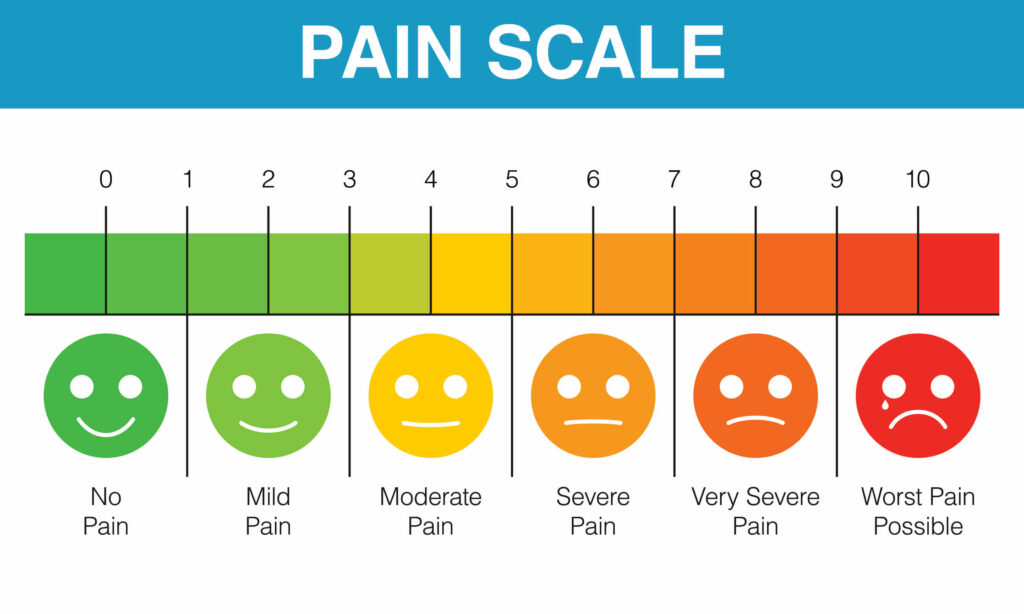What is a pain scale and how might it be used in a personal injury case?
A pain scale is a standardized tool used to measure and assess a person’s subjective experience of pain. It provides a way for individuals to communicate the intensity or severity of their pain to healthcare professionals, typically using a numerical or descriptive rating system.
One commonly used pain scale is the Numeric Rating Scale (NRS), where individuals rate their pain intensity on a scale of 0 to 10, with 0 indicating no pain and 10 representing the worst possible pain. Another widely used scale is the Visual Analog Scale (VAS), where individuals mark their pain level on a line that ranges from “no pain” to “worst pain imaginable.”
Jump to a Section:
Toggle
In a New Orleans personal injury case, a pain scale may be used to help quantify and document the individual’s pain and suffering as a result of the injury. This can be important for determining appropriate compensation in a legal context. By using a standardized pain scale, the individual’s pain can be assessed objectively and compared to other cases or medical guidelines.
The pain scale ratings may be used as evidence in court to demonstrate the impact of the injury on the person’s quality of life and ability to carry out daily activities. It can support their claim for damages in Louisiana personal injury cases by providing a measurable indication of the severity of their pain, which can be influential in settlement negotiations or during a trial.
However, it’s important to note that pain scales have limitations. Pain is a complex and subjective experience that can vary greatly among individuals, and relying solely on a pain scale may not capture the full extent of someone’s suffering. Therefore, other factors such as medical records, expert testimony, and additional evidence may also be considered in personal injury cases to establish the extent of the injury and its impact on the individual. We understand personal injury cases can be complex, which is why we always recommend talking to a New Orleans Personal Injury Lawyer.
How the pain scale can be used to address the causal relationship between the accident and injury?
In a personal injury case, establishing a causal relationship between an accident and the resulting injury is crucial. A pain scale can play a role in this process by providing evidence of the presence and severity of pain following the New Orleans injury accident. Here’s how it can be used:
- Documentation of immediate post-accident pain: If an individual seeks medical attention immediately after an accident, healthcare providers may use a pain scale to assess and document their pain level. This initial pain assessment can establish a connection between the accident and the immediate onset of pain.
- Ongoing pain assessment: Pain scales can be used over time to track the progression or persistence of pain following a New Orleans car accident. Regular pain assessments can demonstrate that the pain is not only present initially but continues to be experienced over a certain period, indicating a potential causal relationship between the accident and the ongoing pain.
- Comparative analysis: Pain scales can be used to compare the individual’s pain levels before and after the accident. If there is a significant increase in pain following the accident and it aligns with the expected consequences of the injuries sustained, it strengthens the argument that the accident directly caused the reported pain.
- Corroboration with medical records: Pain scale ratings can be included in medical records, providing additional support to medical professionals’ diagnoses and treatment plans. This documentation can be valuable evidence to demonstrate the causal relationship between the accident and the subsequent pain as noted by healthcare professionals.
- Expert testimony: In complex personal injury cases, pain scales can be presented and interpreted by medical experts who can provide their professional opinion on the causal relationship between the accident and the reported pain. Expert testimony can carry significant weight in establishing the connection between the accident and the resulting injury.
It’s important to note that pain scales alone may not be sufficient to establish causation definitively. Other medical evidence, diagnostic tests, imaging results, and expert opinions may also be considered to strengthen the argument for causation in a personal injury case.
Contact an Experienced New Orleans Personal Injury and Accident Lawyer Near You
If you are looking for an experienced personal injury lawyer to help you with a claim for injuries sustained due to someone else’s negligence, feel free to contact us today at 866-289-2802 or submit your inquiry online. Please be advised that you may be facing important legal deadlines, so don’t delay. You can also visit us in person at our office.
Contact Form
New Orleans Car Accident Lawyer Review
Take a look at what some of our happy New Orleans clients have to say:
“Awesome to work with. Was on top of everything and kept in touch throughout the entire process. I would definitely recommend. Was honest and fair. Worked extra hard and went beyond to get me the best results.”
Lakietha Hooks, July 1, 2020, Rating: 5/5 ⭐⭐⭐⭐⭐
We have a 4.7 average and 126 reviews on Google

